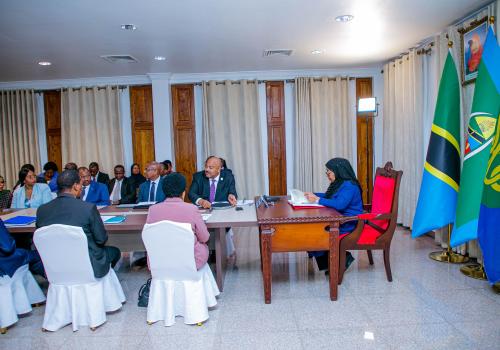In the wake of violent protests and unrest in Mozambique post the October general election, the Southern African Development Community (SADC) is to send its Panel of Elders to the east African country for a hands-on visit.
An indication of the seriousness the regional bloc attaches to member state Mozambique comes with a communique issued after a virtual weekend summit of the SADC Organ on Politics, Defence and Security Co-operation which has it the Panel of Elders to report back in eight days – 15 January. The communique has it the Panel of Elders will “engage” Mozambican government and key opposition leaders.
Zambian President Hakainde Hichilema and Malawian President Lazarus Chakwera, the other members of the troika, attended the meeting, as did Mozambican President Filipe Nyusi and SADC executive secretary Elias Magosi. The meeting was chaired by Tanzanian President Samia Suluhu Hassan.
The action is the latest SADC development on Mozambique which saw an election observer mission oversee the 9 October voting day, followed by an observation that polling was conducted in “a generally calm and peaceful atmosphere”. Post-election violence reared its head, claiming lives and damaging property. “The announcement of the official election results on 23 December 2024 exacerbated tensions in the country,” according to a 31 December SADC statement.
In addition to the Panel of Elders visit, the SADC directed its Inter-State Defence and Security Committee to propose measures for protecting regional trade routes, humanitarian corridors and energy supplies while seeking solutions to Mozambique’s “political and security challenges”.
Maputo has been described in some quarters as being ‘on fire’ as protesters in their thousands express their frustration at the result in the only manner open to them, a result which claimed the ruling party Frelimo had gathered over 70% of the vote.
Protesters took immediately to the streets. A subsequent relook by the electoral commission following weeks of protest, during which hundreds of Mozambicans have been killed by police, agreed there were discrepancies with the vote count but then decided that Frelimo had won by 65%.
Joseph Hanlon reported in his Mozambique News Reports and Clippings column reported that “In the four days 23-26 December, 134 people have been killed by police or in demonstration related incidents. This brings the death toll for the 66 days of demonstration to 261, according to Plataforma Elecitoral Decide, which is keeping the most accurate count.”
Young protesters who took to burning tyres and creating road blocks along principal highways, including the strategically important road between Maputo and South Africa, are now reported to be digging up roads to prevent vehicles from passing.
Meanwhile, opposition leader Venancio Mondlane, who is contesting the election results, says the police are to blame for the vandalism and deaths of a reported 248 protesters. He called for more protests but spoke out against looting or damaging infrastructure.
He accused the police of breaking into warehouses and stores and banks, and of telling the population to come and help themselves to food. “People come in because they’re hungry,” Mondlane said in a live broadcast.
Mondlane on Sunday said he would return to Mozambique to lead demonstrations as the country prepares to swear in President-elect Daniel Chapo on 15 January. Mondlane had fled Mozambique after the October elections and is in hiding over security fears.
It’s also reported that the Maputo prison also known as Machava has been broken into during which about 1 500 inmates escaped. Reports say 33 prisoners died during the confrontation with security forces.
The United Nations Refugee Agency (UNHCR) late last month said more than 2 000 people had fled Mozambique into Malawi while another 1 000 had fled to Eswatini as a result of the unrest.
On 7 January, Hassan said the SADC Organ on Politics, Defence and Security Cooperation was calling for an immediate cessation of hostilities. “We are deeply concerned by the continued loss of lives, injuries, destruction of private property and public infrastructure,” President Hssan said in a statement.
“The current situation has also caused significant economic challenges on the nation and disrupted cross border trade, and hindered the free movement of people. SADC calls upon all parties to exercise restraint and refrain from actions that escalate violence and unrest.”
“South Africa calls on all parties to commit to an urgent dialogue that will heal the country and set it on a new political and development trajectory,” South Africa’s Department of International Relations said in a statement.
“Furthermore, South Africa is ready to assist Mozambique in any manner to facilitate this dialogue. South Africa calls on all parties to exercise restraint and calm.”



